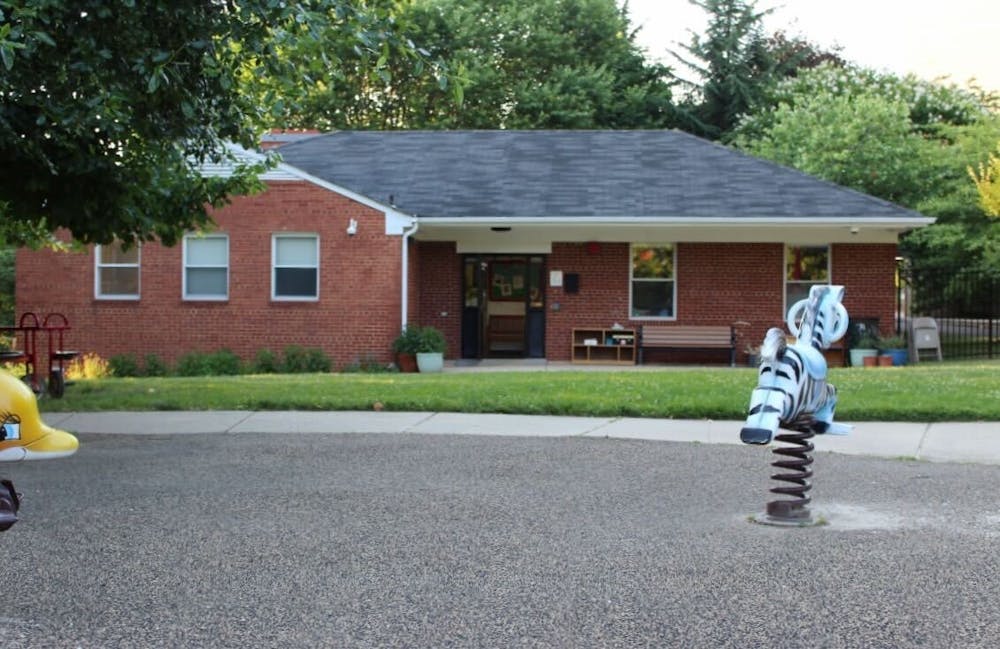When American University announced in June it would be closing its Child Development Center permanently at the end of August, parents were blindsided.
The CDC was an invaluable benefit to faculty, staff and AU community members, but more than that, a place their children loved to be.
“I’m mortified, on behalf of the staff and as a community member, this is a great resource that just hasn’t been managed, but could be wonderful,” said Michael Merwin, a CDC parent and AU alumnus. “It already is wonderful in the sense that it’s great for the kids.”
The Center’s closure immediately raised another question for parents, where would their children go in September? The closure came months after D.C.’s public school lottery deadline, and some did not find the University’s alternative — a one-year subsidy at Bright Horizons, a large childcare company with many locations in the D.C. area — up to par.
Chief Financial Officer, Vice President and Treasurer Bronté Burleigh-Jones wrote in an email announcing the closure that there were “four [Bright Horizons] centers within a mile and a half of campus.” When parents began looking into Bright Horizons in June, the closest was in Chevy Chase, Maryland, 1.8 miles away.
Charlotte Friar, CDC parent and AU alumna, said that anyone who looks into Bright Horizons should be “really skeptical” and that she wouldn’t support it from “an ethical point of view.”
“They are an investor-backed for-profit childcare provider that relies on low wages for their professionals, and so you will not have a career professional … who has been able to make a career in early childhood education, and that will affect the quality of care your child receives,” Friar said. “I don’t think American University should support Bright Horizons by subsidizing care there.”
Several parents asked for a meeting with the University to discuss last-minute full-day closures of the Center. On June 21, University administrators set a meeting with parents. They assumed the meeting would be a discussion to address their concerns. Instead, parents were told the Center would close in just two months.
A few hours after the meeting, Burleigh-Jones notified the AU community of the closure. Parents who could not attend the meeting and are not directly affiliated with the University did not receive notification until an email to all parents was sent the next morning.
In the email to parents obtained by The Eagle, Burleigh-Jones wrote, “Although this was truly a difficult, but necessary, decision for the University we remain mindful of the challenges and impact this decision may present for each of you and your families.”
The University cited “long-standing operating challenges” and staffing issues as their primary reasons for permanent closure. When Merwin enrolled his child on April 13, he said he was “given no indication of any issues.”
“Within a week, they had already started doing closures, and none of those were communicated more than a couple of days in advance,” Merwin said.
Gustavo Ribeiro, a CDC parent and associate professor at AU’s Washington College of Law, said he felt the issues the Center faced could have been resolved with more support from the University.
“We had a wonderful experience at the Center, until a few months ago, both my kids love the Center,” Ribeiro said. “They love their teachers. They love the space. They love their colleagues. We became friends with the parents … We just became a little aware of an apparent lack of support by the University so that the Center could, you know, fulfill its best potential. And that was a little disheartening.”
The CDC staff were not a part of the University’s staff union at the time of the closure announcement, according to Eleanor Sciannella, a financial aid counselor at the University and an SEIU Local 500 elected representative. The union’s current contract includes layoff protections.
“This is a department closure. This is a layoff, as far as I’m concerned,” Sciannella said.
To Sciannella, the closure felt discouraging to female staff especially. In her view, seeing the inaccessibility of childcare is a deterioration to her coworkers moving up in their careers.
“Because, to me, this is not just a matter of a loss of a benefit, which it is,” Sciannella said. “It’s the difference between retaining employees and not. Particularly for women, and particularly because of the way that wages in fields like education have been suppressed because it’s pink-collar work.”
Sciannella said she had spoken to parents and staff who wish to have children in the future that feel affected by this decision.
“I know of a handful of people… who have kids who are young, but would love to use the service in the year,” Sciannella said. “I know of people who don’t have kids right now but [the decision] has jeopardized their ability to stay at AU when they do decide to have kids.”
Simon Nicholson, a CDC parent, associate professor and interim associate dean for research in the School of International Service, felt frustration that parents and the wider University community impacted by the decision were not included.
“It was an announcement without consultation,” Nicholson said. “And by that I mean the people who are going to be most affected, but also the people who could have the most to say about what this represents for the campus and how best to make it flourish, just were not part of the conversation before the announcement. Does that seem right?”
This article was edited by Sydney Hsu, Tyler Davis and Abigail Turner. Copy editing done by Charlie Mennuti, Sabine Kanter-Huchting, Ariana Kavoossi and Ella Rousseau. Fact checking done by Hannah Paisley Zoulek.





